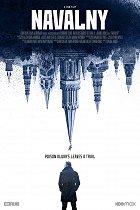Regie:
Daniel RoherStreaming (4)
Inhalte(1)
Der Film startet mit geheimen Aufnahmen in dem Flugzeug, in dem Nawalny auf dem Weg nach Sibirien mit dem russischen Nervengift „Nowitschok“ ermordet werden sollte. Nur durch eine Notlandung und eine Verlegung in die Berliner Charité – die seine Frau Julia gegen den Willen der russischen Regierung durchsetze – konnte er gerettet werden. Wie ein Polit-Thriller dokumentiert und begleitet Daniel Roher Nawalny in schockierenden und ebenso persönlichen Momenten. Von dem Giftanschlag im Flugzeug, über seinen Aufenthalt in Deutschland, bis zu seiner Rückkehr nach Moskau. Direkt nach seiner Landung wurde er noch am Flughafen im Auftrag der russischen Regierung festgenommen. Seitdem sitzt Alexei Nawalny in Haft des Straflagers Pokrow in der Nähe von Moskau, das als besonders hart gilt. Am 22. März 2022 – inmitten des russischen Angriffskrieges auf die Ukraine – wurde seine Strafe wegen angeblichen Betrugs auf neun Jahre Haft verlängert. Nawalnys Anwälte sind in Berufung gegangen und fordern Freispruch. (polyfilm)
(mehr)Kritiken (2)
Navalny begins unobtrusively and seems to focus attention primarily on the investigation of the Russians’ attempt to poison the film’s subject. However, it gradually becomes clear that director Daniel Roher is pursuing many more motifs and the investigative storyline serves mainly to connect them. Also, the portrait of Navalny that the film pieces together from various interviews and situations (mostly original rather than archival footage) becomes less celebratory of its subject. In addition to a loving partner, father and hero of the Russian people, who one woman waiting for his arrival describes as a symbol of freedom, we get to know a man obsessed with controlling his own media image, who sometimes chooses somewhat problematic means of fighting against evil. In the end, the film is not merely a suspenseful thriller, but also a love story, a lesson in digital image-making and – when Navalny, in the style of Sacha Baron Cohen, decides in one unforgettable scene to ingeniously troll his poisoner – a chilling black comedy. Though hopelessness prevailed in the end, I found the film to be an emotionally extraordinarily varied experience. Among other things, it prompts one to consider how authoritarian regimes branded and eliminated their opponents (or generally undesirable opinions) in the past and how they do so today, in the age of the internet, fake news and open borders. 85%
()
“In today’s world of fake news, we don’t trust sources. Because we don’t trust humans. We trust data.” this is true about Navalny as much as Bellingcat. This is a surprisingly intimate account of the few weeks of life after the poisoning as much as it is an investigative one. It is not afraid to ask straight questions, it shows Alexei as a citizen who is charismatic and determined, but who also has a certain but. For its complete lack of distance from events, for how topical it is, it shies away from mawkishness, pedestal medallions, and shorthand and emotionless talking heads. Snowden's Citizenfour tried to do something similar, but failed miserably. In addition, there is the occasional gallows humour; sometimes intended and sometimes resulting from the situation (a facepalm fest during a phone call) or the absurdity of the regime and its executors (or hello again Moscow4). Anyway, it's good enough and accessible enough without being pandering that even if you're allergic to Alexei or hard-core pro-regime, it's worth seeing, and doubly so for those cases.
()

